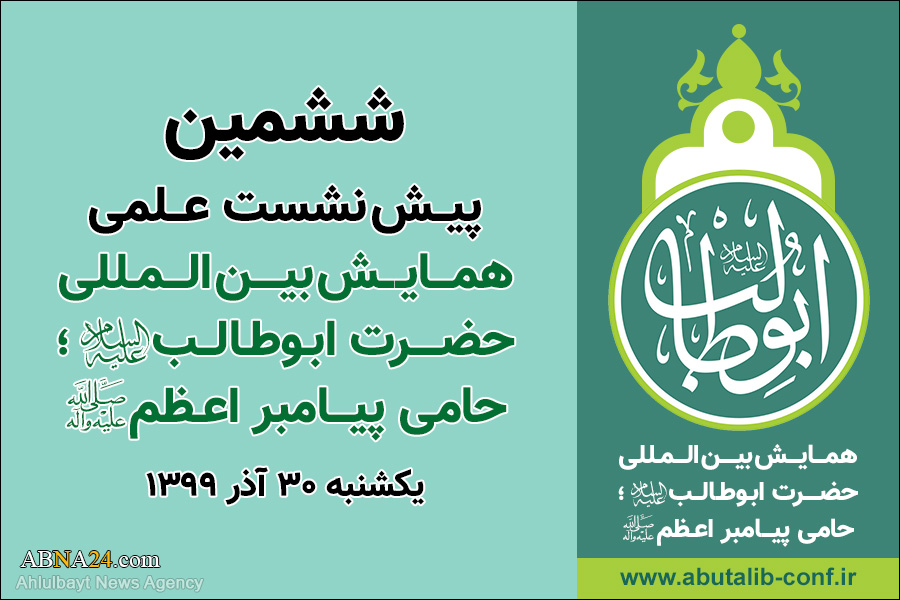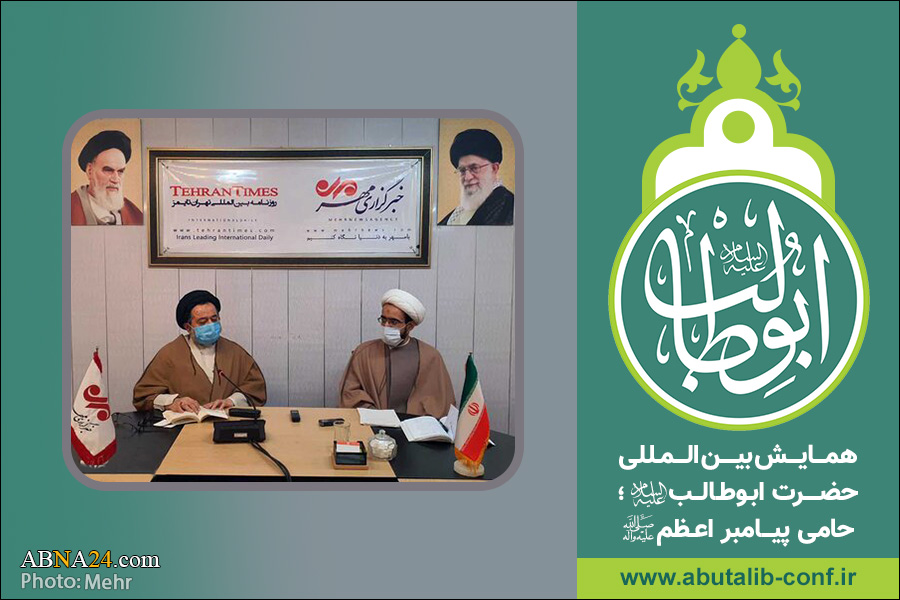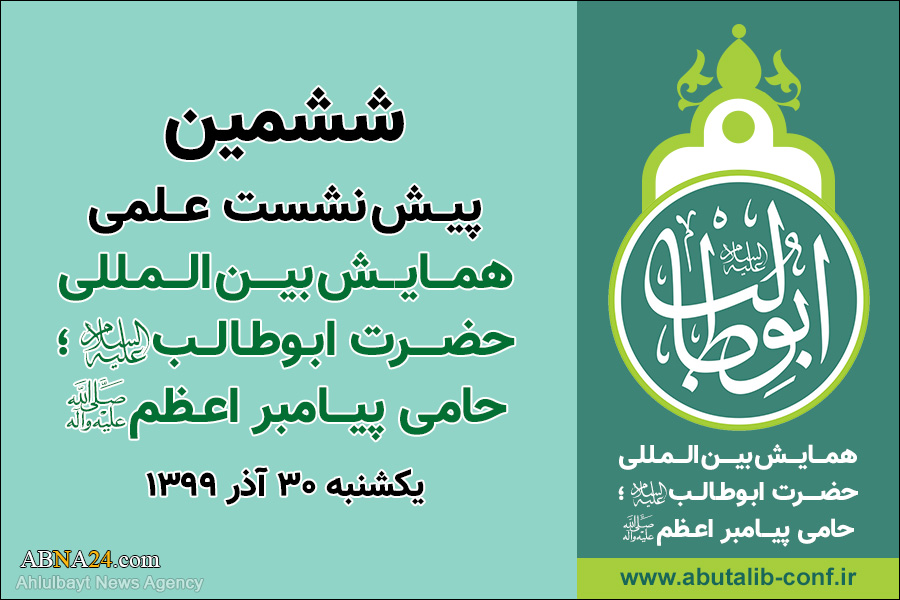6th Abu Talib’s pre-conference/Umayyads tarnished Abu Talib’s image to compensate their notoriety
Referring to the root and consequences of the Umayyads attempts to fabricate the narrations, a history researcher said, “The sin of Hazrat Abu Talib was being the father of a figure like Ali (a.s.), and one of the purposes of tarnishing his image was destroying the personality of Imam Ali.”
The “6th Academic Pre-Conference” of the “International Conference of Hazrat Abu Talib (a.s.); Supporter of the Great Prophet (p.b.u.h)” was held in Qom, following the activities of the conference and holding its preliminary academic and cultural meetings.
The meeting was held on Sunday morning, December 20, 2020, by the Secretariat of the International Conference of Hazrat Abu Talib (a.s.) and hosted by Mehr News Agency. In the meeting, Hojat al-Islam Seyed Majid Portabatabai and Hujat al-Islam Muhammad Ali Moraweji Tabasi discussed and exchanged views.

At the beginning of this meeting, referring to the high character of the ancestors of the Prophet Muhammad (p.b.u.h) and Hazrat Abu Talib (a.s.), and on the theory that “the ancestor and uncle of the Prophet (p.b.u.h) were the Wasis (Wasi here means non-prophet successors of the prophets) of the prophets”, Hojat al-Islam Sayed Majid Pourtatabai said, “In human history, God Almighty has never left people alone, and naturally, during the period of Fitra (in which people should perform their affairs based on their pure inner divine nature) between Prophets, the Arabian Peninsula was not empty of (God’s) Messengers. Imam Kadhim (a.s.) has explicitly stated in a narration that Abdulmutallab (Prophet Muhammad’s grandfather) and Abu Talib (Prophet Muhammad’s uncle) were two successive Wasis who had guardianship over the people of the (Arabian) peninsula to guide them.”
Referring to the compatibility of the evidence and reasons with this narration of Imam Kazem (AS), this researcher of Islamic history said, “Before the starting the mission of the Holy Prophet (p.b.u.h), Hazrat Abdulmutallab enacted five laws on religious rites and social relations. Such as limiting the Tawaf (one of the Islamic rituals of pilgrimage and is compulsory during both the Hajj and Umrah. Pilgrims go around the Kaaba (the most sacred site in Islam) seven times in a counterclockwise direction) of the Kaaba to 7 rounds and setting 100 camels as the ransom (as a compensation for a murder of a man). After Islam, these laws were signed and approved by the prophet Muhammad (p.b.u.h) and were included in the structure and body of Islamic jurisprudence, which not only proves the faith of Abdulmutallab but also shows that he was a Wasi.”
As another witness of the theory, Pourtabatabai pointed to this narration, ““Who was the last Wasi before the Prophet?” Imam Ali (a.s.) was asked, and he answered “My father was.””
“When Hazrat Abu Talib (a.s.) saw his son Imam Ali (a.s.) praying for the first time on the right side of the Prophet (p.b.u.h) next to the Kaaba, he encouraged his other son to pray with them so that he would become the other wing of his cousin.”, he said, as an example of Abu Talib’s support for Islam.
“Also, during the first official invitation and warning of the Holy Prophet (p.b.u.h) to his relatives and the three times support of Imam Ali (a.s.) (of the Prophet) which took place in the house of Abu Talib (a.s.), he, in response to the blame of people like “Abu Jahl”, supported the Prophet (p.b.u.h) and defended the action of his son Ali (a.s.).” The Islamic scholar continued.
Pointing out that in the early days of Islam, among the Muslims who believed in the Prophet, except Ali (a.s.) and the descendants of Abd al-Muttalib, the fathers of the other believers were infidels and polytheists, he added, “To compensate their defect, people like Muawiya started to fabricate the narrations.”
Explaining the roots and consequences of the Umayyads’ efforts to establish fake narrations, Pourtabatabai expressed their purpose of propaganda against Hazrat Abu Talib (a.s.) and said, “In fact, “being the father of Ali (a.s.)” was Abu Talib’s sin and the purpose of his destruction was to destroy the character of Imam Ali (a.s.).”
“The enemies of Islam decided to conspire with Abu Lahab’s wife to entertain him with wine so that they could assassinate the Prophet Muhamad (p.b.u.h) during Abu Lahab’s drunkenness; But Hazrat Abu Talib (a.s.) learned of this plan and sent his son Ali (a.s.) to Abu Lahab’s house to tell him, “One whose uncle is a nobleman of Quraysh, will (should) not be killed”. And so, Abu Lahab was informed and the enemies did not reach their goal.” Said the historian, referring to the decision of the Quraysh infidels to assassinate the Prophet (p.b.u.h) at the end of the life of Abu Talib (a.s.).

Pointing out that all the doubts raised about the character of Hazrat Abu Talib (a.s.) have been rejected and answered with strong arguments, following Hujat al-Islam Pourtabatabai, Hujat al-Islam Muhammad Ali Moraweji Tabasi, said in the meeting, “One of the doubts that has challenged the faith of Hazrat Abu Talib (a.s.) in the eyes of some Sunnis is a collection of narrations entitled “Hadith of Dhahdhah” which has been narrated in Sahih al-Bukhari, Sahih Muslim and Musnad Ahmad ibn Hanbal.”
“This hadith, both in terms of the document, it has important flaws and has content flaws.” Emphasized the researcher of the Quran and Hadith, stating that in Sunni Hadith sources, the hadith of Dhahdhah has been attributed to the Prophet (p.b.u.h) through several documents through “Abu Sa’id Khedri” and “Abbas ibn Abd al-Muttalib”.
“By fabricating this hadith and attributing it to the Prophet (p.b.u.h), the Nawasib (plural for Nasebi: those who are enemies of AhlulBayt) and enemies of the AhlulBayt (a.s.) wanted to Taktir (excommunicate and calling one as a non-believer in Islam) Hazrat Abu Talib (a.s.); unaware that the text of this hadith conflicts with the verses of the Quran.” He said.
“In addition to the conflict with the Quran, these narrations are inconsistent with the consensus of the AhlulBayt (a.s.) that Abu Talib passed away in faith. Also, the textual types of Dhahdhah hadiths conflict with each other.” Moraweji Tabasi continued.
Referring to the confession of Sunni scholars on the faith of Hazrat Abu Talib (AS), he said, “Perhaps it is because of these fundamental flaws that some Sunni scholars have believed Abu Talib (a.s.) was Muslim and had faith in Islam and opposed the hadith of Dhahdhah; Like “Jalal al-Din Suyuti” a Shafi’i Sunni (d. 911 AH, 1505 AD) in the book “al-Ta’zim Walminna””
“Even some Sunni scholars say that the hadith of Dhahdhah not only does not indicate the disbelief of Abu Talib (a.s.) but also proves his correct faith and belief.” Moraweji Tabasi added.
““Ahmad Kheiri Pasha”, (d. 1387 AH, 1967 AD) a Hanafi Sunni has an ode with more than 70 verses in praise and expression of the virtues of Hazrat Abu Talib (a.s.). In some verses of this ode, he refers to the hadith of Dhahdhah and says that this hadith is not compatible with the verse “Al-Sabqoon Al-Sabqoon”.” He added.
“Depriving and keeping away Muslims, especially the youth, from the thoughts, behavior, and lifestyle of Hazrat Abu Talib (a.s.) and creating a false and unrealistic image of him, who helped the Prophet (p.b.u.h) sincerely, bravely and thoughtfully for more than forty years; are unfortunate consequences of the Takfir (excommunication)of Hazrat Abu Talib (a.s.).” Concluded Moraweji Tabasi at the end of this academic session.
It should be mentioned that by the initiation of the AhlulBayt (a.s.) World Assembly, and support and cooperation of the similar institutions, including, “Imam Hossein (a.s.) Holy Shrine”, “Hazrat Aboutaleb Research and Publishing Institute”, “The World Forum for Proximity of Islamic Schools of Thought”, “Islamic Sciences and Culture Academy of Islamic Propagation Office”, “Al-Mustafa International University”, “Hawza Language teaching center”, “International University of AhlulBayt (a.s.)”, “Mirath-e Nabowat Cultural Institute”, “Jamiat al-Zahra Seminary University”, “Zorria al-Nabawia Research Center”, “Qasem ibn al-Hassan (a.s.) Religious-Cultural Institute”, and “Abna al-Rasoul Cultural and Artistic Institute”; international conference “Hazrat Abu Talib (a.s.), Supporter of the Great Prophet (p.b.u.h)” will be held on Rajab 25, 26 and 27, 1442 (March 9, 10 and 11, 2021) on the anniversary of the death of Abu Talib (a.s.).
The deadline for submitting academic works and articles to this conference has been extended until February 18, 2021.
To receive the academic call of the conference, click here.
The other program which will be held on the sideline of the conference is the “General Festival of Poetry about Hazrat Abu Talib (a.s.)”.
To receive the academic call for the Poetry Festival, click here.
Referring to the root and consequences of the Umayyads attempts to fabricate the narrations, a history researcher said, “The sin of Hazrat Abu Talib was being the father of a figure like Ali (a.s.), and one of the purposes of tarnishing his image was destroying the personality of Imam Ali.”
The “6th Academic Pre-Conference” of the “International Conference of Hazrat Abu Talib (a.s.); Supporter of the Great Prophet (p.b.u.h)” was held in Qom, following the activities of the conference and holding its preliminary academic and cultural meetings.
The meeting was held on Sunday morning, December 20, 2020, by the Secretariat of the International Conference of Hazrat Abu Talib (a.s.) and hosted by Mehr News Agency. In the meeting, Hojat al-Islam Seyed Majid Portabatabai and Hujat al-Islam Muhammad Ali Moraweji Tabasi discussed and exchanged views.

At the beginning of this meeting, referring to the high character of the ancestors of the Prophet Muhammad (p.b.u.h) and Hazrat Abu Talib (a.s.), and on the theory that “the ancestor and uncle of the Prophet (p.b.u.h) were the Wasis (Wasi here means non-prophet successors of the prophets) of the prophets”, Hojat al-Islam Sayed Majid Pourtatabai said, “In human history, God Almighty has never left people alone, and naturally, during the period of Fitra (in which people should perform their affairs based on their pure inner divine nature) between Prophets, the Arabian Peninsula was not empty of (God’s) Messengers. Imam Kadhim (a.s.) has explicitly stated in a narration that Abdulmutallab (Prophet Muhammad’s grandfather) and Abu Talib (Prophet Muhammad’s uncle) were two successive Wasis who had guardianship over the people of the (Arabian) peninsula to guide them.”
Referring to the compatibility of the evidence and reasons with this narration of Imam Kazem (AS), this researcher of Islamic history said, “Before the starting the mission of the Holy Prophet (p.b.u.h), Hazrat Abdulmutallab enacted five laws on religious rites and social relations. Such as limiting the Tawaf (one of the Islamic rituals of pilgrimage and is compulsory during both the Hajj and Umrah. Pilgrims go around the Kaaba (the most sacred site in Islam) seven times in a counterclockwise direction) of the Kaaba to 7 rounds and setting 100 camels as the ransom (as a compensation for a murder of a man). After Islam, these laws were signed and approved by the prophet Muhammad (p.b.u.h) and were included in the structure and body of Islamic jurisprudence, which not only proves the faith of Abdulmutallab but also shows that he was a Wasi.”
As another witness of the theory, Pourtabatabai pointed to this narration, ““Who was the last Wasi before the Prophet?” Imam Ali (a.s.) was asked, and he answered “My father was.””
“When Hazrat Abu Talib (a.s.) saw his son Imam Ali (a.s.) praying for the first time on the right side of the Prophet (p.b.u.h) next to the Kaaba, he encouraged his other son to pray with them so that he would become the other wing of his cousin.”, he said, as an example of Abu Talib’s support for Islam.
“Also, during the first official invitation and warning of the Holy Prophet (p.b.u.h) to his relatives and the three times support of Imam Ali (a.s.) (of the Prophet) which took place in the house of Abu Talib (a.s.), he, in response to the blame of people like “Abu Jahl”, supported the Prophet (p.b.u.h) and defended the action of his son Ali (a.s.).” The Islamic scholar continued.
Pointing out that in the early days of Islam, among the Muslims who believed in the Prophet, except Ali (a.s.) and the descendants of Abd al-Muttalib, the fathers of the other believers were infidels and polytheists, he added, “To compensate their defect, people like Muawiya started to fabricate the narrations.”
Explaining the roots and consequences of the Umayyads’ efforts to establish fake narrations, Pourtabatabai expressed their purpose of propaganda against Hazrat Abu Talib (a.s.) and said, “In fact, “being the father of Ali (a.s.)” was Abu Talib’s sin and the purpose of his destruction was to destroy the character of Imam Ali (a.s.).”
“The enemies of Islam decided to conspire with Abu Lahab’s wife to entertain him with wine so that they could assassinate the Prophet Muhamad (p.b.u.h) during Abu Lahab’s drunkenness; But Hazrat Abu Talib (a.s.) learned of this plan and sent his son Ali (a.s.) to Abu Lahab’s house to tell him, “One whose uncle is a nobleman of Quraysh, will (should) not be killed”. And so, Abu Lahab was informed and the enemies did not reach their goal.” Said the historian, referring to the decision of the Quraysh infidels to assassinate the Prophet (p.b.u.h) at the end of the life of Abu Talib (a.s.).

Pointing out that all the doubts raised about the character of Hazrat Abu Talib (a.s.) have been rejected and answered with strong arguments, following Hujat al-Islam Pourtabatabai, Hujat al-Islam Muhammad Ali Moraweji Tabasi, said in the meeting, “One of the doubts that has challenged the faith of Hazrat Abu Talib (a.s.) in the eyes of some Sunnis is a collection of narrations entitled “Hadith of Dhahdhah” which has been narrated in Sahih al-Bukhari, Sahih Muslim and Musnad Ahmad ibn Hanbal.”
“This hadith, both in terms of the document, it has important flaws and has content flaws.” Emphasized the researcher of the Quran and Hadith, stating that in Sunni Hadith sources, the hadith of Dhahdhah has been attributed to the Prophet (p.b.u.h) through several documents through “Abu Sa’id Khedri” and “Abbas ibn Abd al-Muttalib”.
“By fabricating this hadith and attributing it to the Prophet (p.b.u.h), the Nawasib (plural for Nasebi: those who are enemies of AhlulBayt) and enemies of the AhlulBayt (a.s.) wanted to Taktir (excommunicate and calling one as a non-believer in Islam) Hazrat Abu Talib (a.s.); unaware that the text of this hadith conflicts with the verses of the Quran.” He said.
“In addition to the conflict with the Quran, these narrations are inconsistent with the consensus of the AhlulBayt (a.s.) that Abu Talib passed away in faith. Also, the textual types of Dhahdhah hadiths conflict with each other.” Moraweji Tabasi continued.
Referring to the confession of Sunni scholars on the faith of Hazrat Abu Talib (AS), he said, “Perhaps it is because of these fundamental flaws that some Sunni scholars have believed Abu Talib (a.s.) was Muslim and had faith in Islam and opposed the hadith of Dhahdhah; Like “Jalal al-Din Suyuti” a Shafi’i Sunni (d. 911 AH, 1505 AD) in the book “al-Ta’zim Walminna””
“Even some Sunni scholars say that the hadith of Dhahdhah not only does not indicate the disbelief of Abu Talib (a.s.) but also proves his correct faith and belief.” Moraweji Tabasi added.
““Ahmad Kheiri Pasha”, (d. 1387 AH, 1967 AD) a Hanafi Sunni has an ode with more than 70 verses in praise and expression of the virtues of Hazrat Abu Talib (a.s.). In some verses of this ode, he refers to the hadith of Dhahdhah and says that this hadith is not compatible with the verse “Al-Sabqoon Al-Sabqoon”.” He added.
“Depriving and keeping away Muslims, especially the youth, from the thoughts, behavior, and lifestyle of Hazrat Abu Talib (a.s.) and creating a false and unrealistic image of him, who helped the Prophet (p.b.u.h) sincerely, bravely and thoughtfully for more than forty years; are unfortunate consequences of the Takfir (excommunication)of Hazrat Abu Talib (a.s.).” Concluded Moraweji Tabasi at the end of this academic session.
It should be mentioned that by the initiation of the AhlulBayt (a.s.) World Assembly, and support and cooperation of the similar institutions, including, “Imam Hossein (a.s.) Holy Shrine”, “Hazrat Aboutaleb Research and Publishing Institute”, “The World Forum for Proximity of Islamic Schools of Thought”, “Islamic Sciences and Culture Academy of Islamic Propagation Office”, “Al-Mustafa International University”, “Hawza Language teaching center”, “International University of AhlulBayt (a.s.)”, “Mirath-e Nabowat Cultural Institute”, “Jamiat al-Zahra Seminary University”, “Zorria al-Nabawia Research Center”, “Qasem ibn al-Hassan (a.s.) Religious-Cultural Institute”, and “Abna al-Rasoul Cultural and Artistic Institute”; international conference “Hazrat Abu Talib (a.s.), Supporter of the Great Prophet (p.b.u.h)” will be held on Rajab 25, 26 and 27, 1442 (March 9, 10 and 11, 2021) on the anniversary of the death of Abu Talib (a.s.).
The deadline for submitting academic works and articles to this conference has been extended until February 18, 2021.
To receive the academic call of the conference, click here.
The other program which will be held on the sideline of the conference is the “General Festival of Poetry about Hazrat Abu Talib (a.s.)”.
To receive the academic call for the Poetry Festival, click here.


